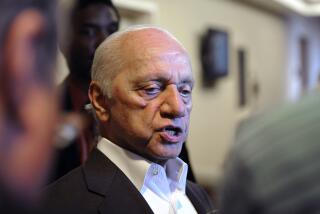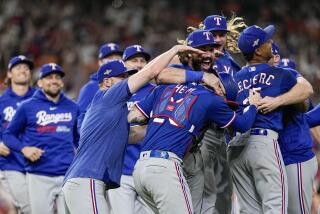Ex-Orioles Leave Baltimore and Worries Behind
- Share via
BALTIMORE — Rafael Palmeiro, Mark McLemore, Todd Zeile, Johnny Oates, Dick Bosman and Jerry Narron were in a particularly good mood as they left Oriole Park at Camden Yards Thursday after a smooth, easy 3-1 victory.
Part of the reason for their smiles, their good cheer and their glowing confidence was that they’re now wearing the uniform of the Texas Rangers and not that of the often tension-wracked, underachieving Baltimore Orioles.
Good things happen to good people, although sometimes it helps to get fired, traded or ignored in your free agent year by the Orioles’ ownership and its musical-chairs brain trust. In baseball, Discarded By The Orioles has become comparable to the Good Housekeeping Seal of Approval.
Everywhere you look, Robby Alomar, Armando Benitez, Eric Davis, Kevin Brown, David Wells, Jamie Moyer and Curt Schilling are tearing it up. Every team has “the one that got away.” You can’t keep everybody. But, in the Orioles’ case, there’s something rejuvenating about escaping Crab City.
The Rangers are merely the extreme case. McLemore could score 110 runs, a ton for an adequate second baseman. Zeile is merely hitting .305 and aimed squarely at 102 RBI. And then there’s Palmeiro. The first baseman the Orioles should never have let get away, and whose departure led them to their desperate signing of Albert Belle, is hitting .343 and is on pace for 136 RBI.
“I waited and I waited and I waited for the Orioles to make me an offer last season,” Palmeiro said Thursday. “I told them I didn’t want anything outrageous -- not $70, $80 or $90 million. Just a fair offer. They never made one. Never showed any interest in me. The Rangers did.”
Any feelings when you play the Orioles, Raffy?
“I didn’t bite ‘em this series,” he said, grinning, “but I did last time.” In his first three games this season against the Orioles, he had two singles, two doubles, two homers and six RBI.
The most startling aspect of the Rangers in this series was the calm, confident way they cruised through each game, reflecting Oates’ self-assured reign. Yes, a calm, confident Johnny Oates. He’s so sensible now that he’ll sometimes go to the racetrack on game day instead of sleeping in his office or having an anxiety attack.
Since leaving the Orioles after the ’94 season, with his nerves and his reputation in tatters, Oates has become one of baseball’s most respected winners--yes, winners. He’s on the verge of his third division title in five Rangers seasons. It’s helped that he knows he has the full support of ownership and his stellar general manager, Doug Melvin. OK, Melvin is an ex-Oriole, too.
Oates’ four seasons as manager of the Orioles, when he was an angry, worried, insecure, nervous wreck--constantly tormented by the thought of being fired--seem far away. Back then, there were days when he was so down that, when you asked him questions, he was near tears or, once, actually crying.
Is this the same Oates--laughing, swapping old stories with Jim Palmer? “When I played for the Orioles, Earl Weaver only spoke to me twice (in the dugout),” Oates recalled. “Once, our catcher got hurt and I said, ‘I’ll get in there for you, Earl.’ He said, ‘Fat chance.’
“After I got traded, he said, ‘Enjoy Atlanta.’ ”
To his credit, Oates is the first to point out that he was “a lot of the problem. Baseball had me like this,” he says, snapping his hand into a tense, clenched fist. “There were people trying to help me and I couldn’t hear. It had such a grip on me. ...
“I finally let go. Then everything got better.” But not until after he left the Orioles.
Something about the way players leave Baltimore seems to stick in their minds. “Johnny Oates did not deserve one thing they did to him here,” pitching coach Bosman said Thursday. Discount some of that for loyalty. But there’s frequently an edge such as Bosman’s in the voices of ex-Orioles.
It’s just a hard fact that the Orioles would be a better team if they had Melvin, Oates and Bosman as their general manager, manager and pitching coach, respectively. Look at the Rangers, nine game ahead in the American League West. They don’t have a starting pitcher with as much stuff as Mike Mussina, Scott Erickson or Sidney Ponson. Not close.
The Rangers are 60-41. The Orioles 46-55. Yet, hold onto your hats, there’s little statistical difference between the two teams. The Orioles are third in the league in hitting (.287) with 550 runs, the Rangers are fifth (.283) with 574 runs. In pitching, their next to each other--eighth and ninth. Both have allowed 535 runs. So why are the Rangers a power, the Orioles a dud?
Much of the reason is Oates. “I’ve been with Billy Martin, Gene Mauch and Dick Williams,” said Narron, the bench coach. “Johnny is right there with ‘em. I wonder if he knows how good he is.”
Oates understands that a team is a living organism, not a statistical collection. It must have a playing style, a sense of how and why it wins. The Rangers realize they can score, but also will allow runs--until the bullpen door opens. Texas is as good once its starter leaves the mound as the Orioles have been pathetic. The Rangers have unearthed superb set-up men for John Wetteland in castoff journeyman Jeff Zimmerman (0.76 ERA) and lefty Mike Venafro (2.91) from Chantilly, Va.
Oates asks his team to “keep us close” for five innings. Then, he starts managing while, presumably, his big bats keep hacking. Thursday’s game was an example. Tied after four innings, the Rangers pulled away.
Little has changed in Baltimore in the five years since Oates, Bosman, Melvin and McLemore left. Whenever the Orioles approach a crisis, on the field or in the front office, they tend to function out of fear. For example, they proclaimed this Texas series “crucial” to their wild-card chances. Then they lost it.
The Orioles have two days before the trading deadline. Should Scott Erickson, Juan Guzman, Arthur Rhodes or all of them be dealt? How can you make a clear-eyed decision if you’re haunted by so many ghosts?
“To work out of desperation,” said Oates, shaking his head, “I don’t wish that on anyone.”
He doesn’t have to wish it on the Orioles. So often, they inflict it on themselves.










